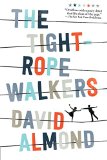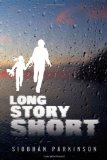Summary | Excerpt | Reading Guide | Reviews | Beyond the book | Read-Alikes | Genres & Themes | Author Bio

My friend's son and a group of his friends were playing a war game on the school playground, using sticks for guns. In the middle of the game, a teacher came running over to them. Game over, she said. Don't you know you aren't allowed to play war here? What do you think these are? she said, snatching the sticks up into the air. One boy was brave enough to respond. They're sticks, he said. And then he got braver. They're not real guns, he said, we know that. Do you?
This question of what is real and what is imaginary is at the heart of David Almond's stark and poetic novel, Raven Summer. Liam Lynch lives in remote, seemingly quiet Northumberland, England, but war is not so far away. Jets heading for Iraq fly overhead and there is a story of a reporter being held hostage in Baghdad - war is literally in the air. During the life-changing summer in which this story takes place, Liam breathes all of this war in as he plays the games that any boy might play: football, pretend war games, and a sort of glorified hide-and-seek called Spotlight.
Raven Summer begins dramatically, with Liam finding an abandoned baby. Soon thereafter he meets Crystal, a wild-spirited foster child, and Oliver, a Liberian refugee who is also in foster care. Crystal calls Liam's life "normal," but Almond's rendering of his life turns that notion of normal upside down. Liam's father spends all of his time holed up in his office writing fiction while Liam's mother has begun showing photographs of Liam's cuts and bruises in an art gallery. And Gordon Nattrass, Liam's childhood friend, bullies and provokes violence in other kids, especially Liam. As Liam's life entwines with Crystal's and Oliver's, the intersection of these new relationships with his everyday life and boyhood games evokes the novel's most startling explorations.
"If you can imagine doing something, then you can do it," says Liam's father. The human mind is not guarded by a stone wall or a sound-proof sheet of glass. It is penetrable. It is moldable. It is malleable. What the mind believes is real one day might be challenged the next. And in the mind of a child - well, this is all the more true. At the heart of Raven Summer is this question of what is real and what is imaginary, but Almond pulls apart the heart and reveals its fragile, tender interior. How do children separate what is real and what is imagined? If something imaginary provokes something real, does that make the imaginary thing real too? Are children born innocent and does the landscape upon which they grow create their violence? Or are we born with violence inherently coursing through our veins? Crystal says, "Any one of us could be a murderer if they got us early enough. The murderer in all of us is just below the skin." Is she right?
By skillfully and intentionally layering Raven Summer with multiple through lines - the orphan baby, Oliver and Crystal's escape, Nattress' bullying, Liam's parents' art, and Liam's coming of age - David Almond creates a stunning portrait of what war and violence can do to the heart, mind, and body of a child.
So, sticks are sticks and guns are guns. That much is clear. Or is it?
This book is well suited to young adult readers, ages 12 and up.
David Almond's latest novel My Name is Mina, published in the USA in October 2011.
![]() This review was originally published in The BookBrowse Review in February 2010, and has been updated for the
October 2011 edition.
Click here to go to this issue.
This review was originally published in The BookBrowse Review in February 2010, and has been updated for the
October 2011 edition.
Click here to go to this issue.

If you liked Raven Summer, try these:

by David Almond
Published 2016
In a raw and beautifully crafted bildungsroman, David Almond reveals the rich inner world of a boy teetering on the edge of manhood.

by Siobhan Parkinson
Published 2011
From Ireland's first laureate for children's literature comes a story of abuse and neglect told with sincerity, heart, and a healthy dose of humor.
Your guide toexceptional books
BookBrowse seeks out and recommends the best in contemporary fiction and nonfiction—books that not only engage and entertain but also deepen our understanding of ourselves and the world around us.